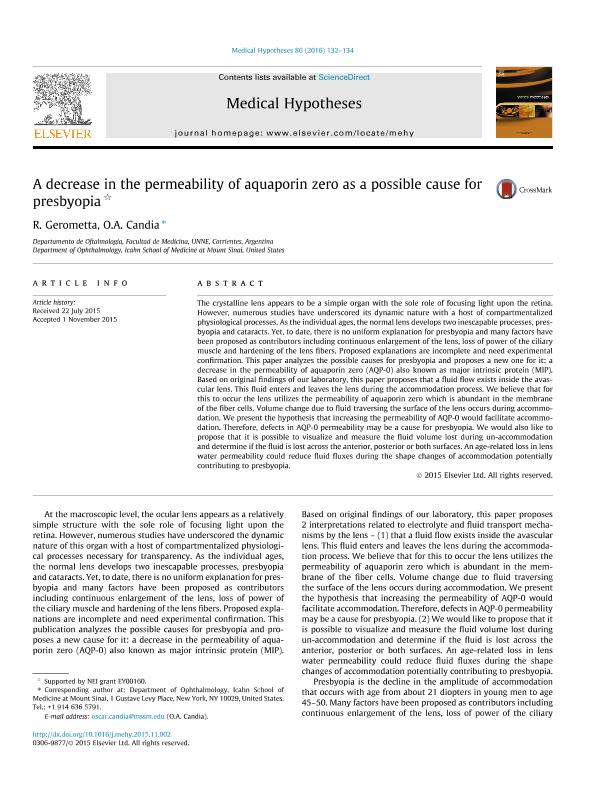Artículo
A decrease in the permeability of aquaporin zero as a possible cause for presbyopia
Fecha de publicación:
01/2016
Editorial:
Churchill Livingstone
Revista:
Medical Hypotheses
ISSN:
0306-9877
e-ISSN:
1532-2777
Idioma:
Inglés
Tipo de recurso:
Artículo publicado
Clasificación temática:
Resumen
The crystalline lens appears to be a simple organ with the sole role of focusing light upon the retina. However, numerous studies have underscored its dynamic nature with a host of compartmentalized physiological processes. As the individual ages, the normal lens develops two inescapable processes, presbyopia and cataracts. Yet, to date, there is no uniform explanation for presbyopia and many factors have been proposed as contributors including continuous enlargement of the lens, loss of power of the ciliary muscle and hardening of the lens fibers. Proposed explanations are incomplete and need experimental confirmation. This paper analyzes the possible causes for presbyopia and proposes a new one for it: a decrease in the permeability of aquaporin zero (AQP-0) also known as major intrinsic protein (MIP). Based on original findings of our laboratory, this paper proposes that a fluid flow exists inside the avascular lens. This fluid enters and leaves the lens during the accommodation process. We believe that for this to occur the lens utilizes the permeability of aquaporin zero which is abundant in the membrane of the fiber cells. Volume change due to fluid traversing the surface of the lens occurs during accommodation. We present the hypothesis that increasing the permeability of AQP-0 would facilitate accommodation. Therefore, defects in AQP-0 permeability may be a cause for presbyopia. We would also like to propose that it is possible to visualize and measure the fluid volume lost during un-accommodation and determine if the fluid is lost across the anterior, posterior or both surfaces. An age-related loss in lens water permeability could reduce fluid fluxes during the shape changes of accommodation potentially contributing to presbyopia.
Palabras clave:
Lens
,
Cataracts
,
Presbyopia
,
Aquaporin
Archivos asociados
Licencia
Identificadores
Colecciones
Articulos(CCT - NORDESTE)
Articulos de CTRO.CIENTIFICO TECNOL.CONICET - NORDESTE
Articulos de CTRO.CIENTIFICO TECNOL.CONICET - NORDESTE
Citación
Gerometta, Rosana María del Rosario; Candia, O.A.; A decrease in the permeability of aquaporin zero as a possible cause for presbyopia; Churchill Livingstone; Medical Hypotheses; 86; 1-2016; 132-134
Compartir
Altmétricas




